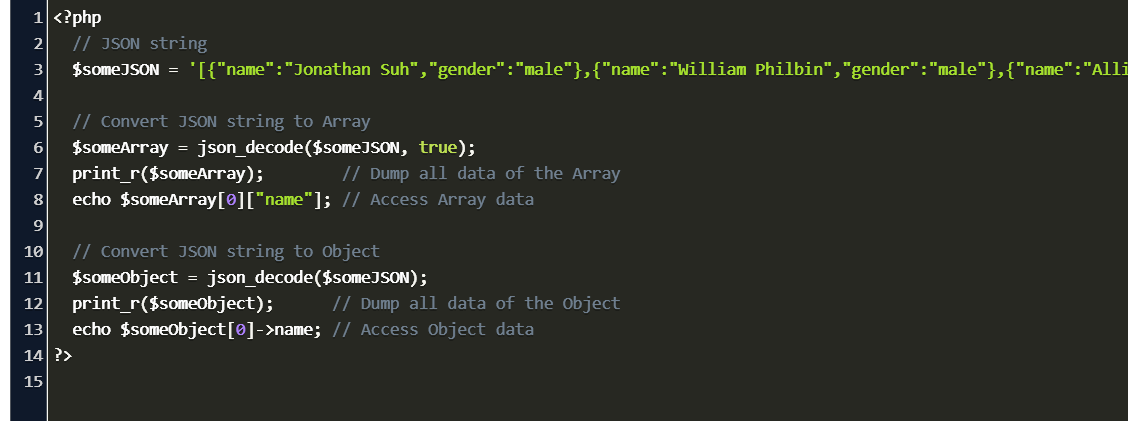
Each token is represented by one bit in the return code. The json_obj_parse() function is going to return a positive-value that correlates to which tokens of the JSON object were successfully found and validated. You must use JSON parse return codes to validate your data! LOG_INF("Value: %d", heater_settings.heater_temp.value) LOG_INF("Unit: %s", heater_settings.heater_temp.unit) LOG_INF("calculated return code: %d", expected_return_code) LOG_INF("json_obj_parse return code: %d", ret)
#JSON DECODE CODE#
LOG_ERR("Not all values decoded Expected return code %d but got %d", expected_return_code, ret) Int ret = json_obj_parse(str, sizeof(str), Int expected_return_code = (1 << ARRAY_SIZE(heater_unit_descr)) - 1 The string you’ll receive is a key-value pair that looks like this: " One of the first examples you should try out is the lightdb/get sample that simple asks for an endpoint called / counter. It’s very easy to get data to and from the Golioth Cloud. So today I’ll walk you through the process. The nice thing is that once you get the hang of it, parsing data and accessing those values becomes very easy. At first blush this seems tedious, but what you get out of it is validation of both the key and the received value type. The only thing you really need to do is to make a struct that tells Zephyr how the incoming data will be organized. That’s why it’s really nice that Zephyr has a built-in JSON library which does most of the work for you.

JSON and microcontrollers? Take a breath, dry those sweaty palms, and keep reading! When it comes to working with the C language, parsing strings for punctuation delimiters doesn’t sound like much fun. Here at Golioth that means your microcontroller of choice is going to be sending and receiving JSON. When two machines talk to one another they need to settle on a data format. JSON_ERROR_UNSUPPORTED_TYPE: An unsupported type was found.Storing and retrieving data from the cloud is the foundational concept of the Internet of Things.JSON_ERROR_INF_OR_NAN: One or more NAN or INF values in the value to be encoded.JSON_ERROR_RECURSION: Recursion detected.Then, in PHP 5.5, they added three more constants: JSON_ERROR_UTF8: Bad UTF8 character was found.In PHP 5.3.3, another constant was added: JSON_ERROR_CTRL_CHAR: Bad character was found.JSON_ERROR_STATE_MISMATCH: Invalid JSON.If an error has occurred, it will return one of the following constants: Thankfully, in PHP 5.3.0, the function json_last_error was introduced. Throw new Exception('Could not decode JSON') Or, with json_decode: $val = json_decode($structure, true) Throw new Exception('Could not encode JSON') Prior to PHP 5.3.0, JSON error handling in PHP looked a little like this (throwing Exceptions): $val = json_encode($myArr) If the depth of your PHP array was too “deep”, then it would return a FALSE value. The json_decode function was also pretty similar in the way that it returned NULL whenever it received malformed / incorrect JSON strings. Before that, json_encode would return a NULL value or a FALSE value and you’d have to use an external JSON validation tool to try and figure out what was going wrong.įor example, if your data had special (non-UTF8) characters, the json_encode function would often return a NULL value.

It wasn’t until PHP version 5.3.0 that the function json_last_error was introduced that. Unfortunately, the error handling in the earlier versions of PHP is non-existent.


 0 kommentar(er)
0 kommentar(er)
